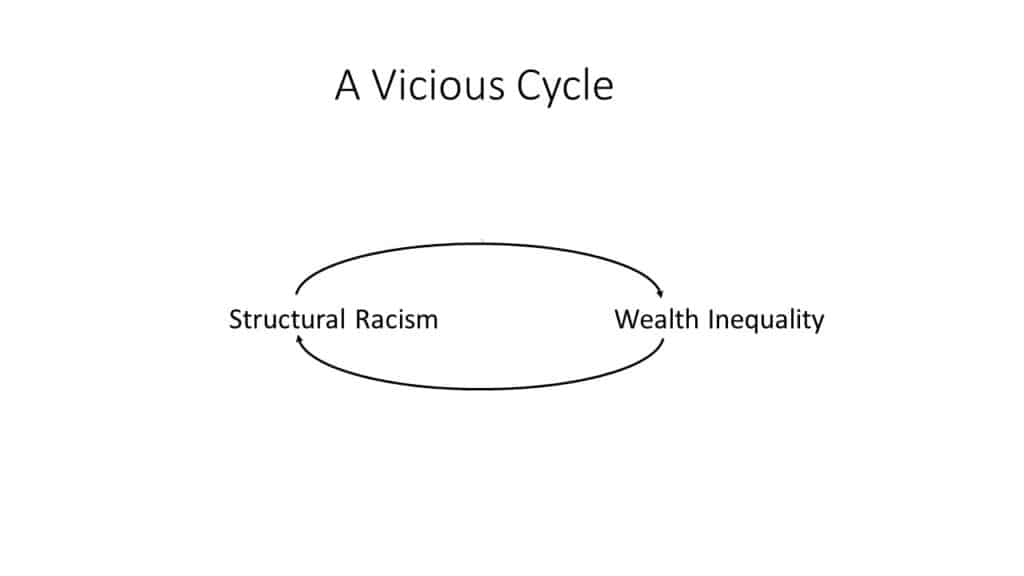Our combined outrage at the brutal treatment of Black people by police and the differential impact of COVID on people of color who comprise essential workers has pushed structural racism to the foreground of American consciousness. Racism is a legitimate cause of passionate concern. At the same time we also need to address another equally disruptive force in our society: the growing wealth inequality that is also a source of structural racism.
While we are becoming more aware of how structural racism increases the wealth gap between whites and people of color, we also need to understand how wealth inequality exacerbates structural racism. Not only does the vicious cycle in the following figure make it harder to reduce racism, but it also threatens the very social, economic, and political fabrics of our nation.
The goals of this post are to illuminate the interdependencies between structural racism and wealth inequality and to suggest initial leverage points for breaking this cycle.

So many events over the past few months – from the police killing of George Floyd to Amy Cooper’s demeaning use of white privilege, the uncovered murder of Ahmaud Arbery, and the harsh backlash against peaceful protesters encouraged by President Trump – have thrust our country’s racist tendencies into the foreground once more. Outrage at racial inequity has also been amplified by the differential impact of COVID on people of color; Black and Hispanic Americans are 2-4 times more likely to die from the disease than white Americans.[i] People in both groups are employed primarily as essential front-line workers, those who earn the least amount of money while being subjected to the greatest risk of exposure to the virus.
The vulnerability of African Americans to disease can be traced back to their enslavement. Sabrina Strings, a University of California, Irvine associate professor of sociology writes, “The era of slavery was when white Americans determined that black Americans needed only the bare necessities, not enough to keep them optimally safe and healthy. It set in motion black people’s diminished access to healthy foods, safe working conditions, medical treatment and a host of other social inequities that negatively impact health.[ii] African Americans continued to face discrimination even after they were officially freed from slavery. They initially were denied property which had been promised to them as reparations. They subsequently endured Jim Crow laws that denied their equal access to housing, education, and voting rights. They have also been subjected to police discrimination, and over the past 40 years they have been the targeted victims of mass incarceration (characterized by Michelle Alexander as The New Jim Crow).[iii] Mass incarceration has broken up their families and communities as well as left generations of their men unable to find viable employment even after being released from prison.
In summary African Americans have been systematically denied the ability to acquire the basic resources required for wealth generation. Structural racism is an underlying cause of wealth inequality between African Americans and whites. For example, Black families in America earn just $57.30 for every $100 in income earned by white families, according to the Census Bureau’s Current Population Survey. For every $100 in white family wealth, black families hold just $5.04.[iv] Furthermore, Blacks are more than twice as likely to be poor, and the Black unemployment rate is almost double the rate for whites.[v]
At the same time wealth inequality also exists as a major problem in the U.S. independent of race. For example, the top 1% of U.S. families now earn more than 20% of the country’s total income, and the top 0.1% hold 22% of total household wealth. Together, the wealthiest 160,000 families own as much wealth as the poorest 145 million families[vi]
People with wealth exacerbate structural racism in three ways:
- They develop a sense of entitlement – either consciously or unconsciously – which leads them to assume they are better and more deserving than poor people. This assumption shows up with respect to both people of color, depicting African Americans in President Reagan’s words as lazy “welfare queens”, and uneducated white people described in Hillary Clinton’s words as a “basket of deplorables.”
- Those with a conscious sense of entitlement fan tension between racial and ethnic groups to divert attention from the profound unfairness of their wealth. Nobel Prize winning economist Paul Krugman notes, “The core story of U.S. politics over the past four decades is that wealthy elites have weaponized white racism to gain political power, which they used to pursue policies that enriched the already wealthy at workers’ expense.”[vii]
- Those with a conscious sense of entitlement also disparage and undermine the effectiveness of government, thereby diminishing society’s capacity to champion the public good. This manifests as ongoing pressure to: reduce government funding for such public goods as housing, education, and healthcare; regress income taxes; strengthen corporate influence over market competitiveness, political campaigns, and employees; and increase voting restrictions.
In summary, both structural racism and wealth inequality are exacerbated by the dark art of misdirection: redirecting outrage from extreme class differences to ethnic conflict, and from the undue influence of people with “deep pockets” to a purported “deep state.”
Perhaps the most important thing we can begin to do to break the vicious cycle between structural racism and wealth inequality is to challenge white people’s assumptions of entitlement. For wealthy whites, this means recognizing that privilege derives primarily from inherited wealth instead of merit – that self-worth is ultimately determined by moral instead of material resources, and that gratitude and generosity are ultimately more fulfilling responses to privilege than pride and prejudice. For uneducated whites, this means: 1) developing the capacities and conditions required to earn a good living in a changing economy, and 2) resisting the siren’s call to feel better about themselves by denigrating people of color, a call that disempowers them through such means as blaming others, denying reality, and succumbing to opioid addiction.
In addition to challenging these assumptions, we need to redress wealth imbalances that lead the rich to get richer and the poor to get poorer. At a policy level this means supporting interventions that redistribute existing wealth as well as investments in education and economic development that enable the country to generate new wealth and all poor people to earn a decent living. If you have money to invest and want to redress imbalances caused by structural racism, you can make such moves as shifting your savings to Black-owned banks, supporting Black-owned start-ups, contributing to community development organizations in poor areas, and divesting your portfolio of companies that benefit from low-cost prison labor.
We cannot win the fight for racial equity without also striving to increase wealth equality. Although the poverty faced by people of color and working class whites arise from different histories, it is in the interests of both groups to collaborate to achieve the deeply connected goals of racial and economic justice. Moreover, people of privilege also stand to gain from a more just society to stabilize our country and save the world we all inhabit.
[i] Medical News Today, “Racial inequalities in COVID-19 – the impact on black communities”, June 5, 2020
[ii] “It’s not obesity. it’s slavery”. New York Times Opinion Page. May 25, 2020.
[iii] Michelle Alexander, The New Jim Crow, The New Press, 2012
[iv] Emily Badger, “Whites Have Huge Wealth Edge Over Blacks (and Don’t Know It).” New York Times. Sept. 18, 2017.
[v] Kiersten Schmidt, “Black families in the U.S. have 90% less wealth than white families”, Grow, June 4, 2020
[vi] Matthews, Chris (2014, October 31). Wealth Inequality in America: It’s Worse than You Think. Fortune.
[vii] Paul Krugman, “Trump Takes Us to the Brink”, New York Times, June 2, 2020
